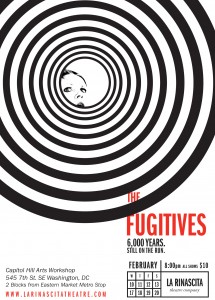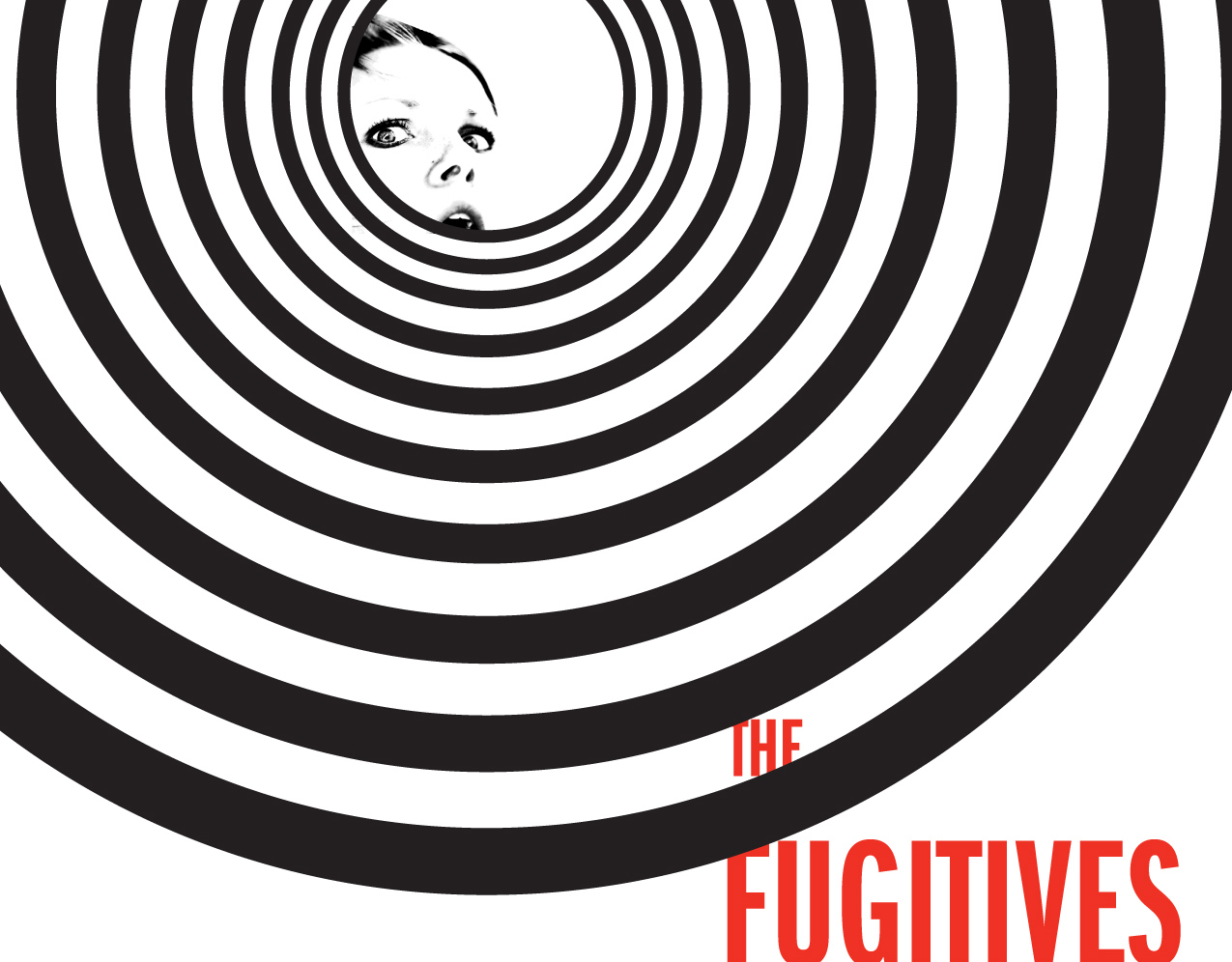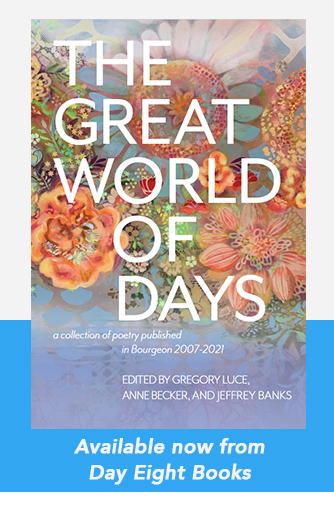I remember the exact moment I first wanted to be an actor, but I can’t recall the day or even nail down a month or season in which I realized that wasn’t enough. My partner David and I formed La Rinascita (ree-NAH-shee-ta) to explore a collaborative model of theatrical development and production. We consider ourselves theatre artists first and our defined roles (director and actor, respectively) second. We craft each piece from top to bottom, not relying on a dictated script. While we know we’re not the first people to work this way, it feels a lot of the time like we are. We make everything up as we go; we are learning our art by doing it. The beauty and the terror of theatre is that you can’t just sit in your basement experimenting, you have to get up and share it with people. Theater isn’t theatre until you have an audience.
The first 5 months of work on our upcoming show, The Fugitives, were spent entirely at the drafting board. A deconstruction of Aeschylus’ Oresteia, our piece follows Orestes and Electra (the siblings who killed mom after she killed dad) 6000 years (give or take a millennium) after the major events of their lives. We planned everything out. It was beautiful. And it got shot to shit as soon as we hit the rehearsal room. Seeing theatre breathe can suddenly make something that was powerful on paper utterly insignificant; a wonderfully conceptualized journey into a dream world involving a glass of milk refused to look anything but silly when people actually did it.
The Québécious artist Robert Lepage, one of our major inspirations, said “Theatre takes shape in flight, when its meaning and direction escape us, when it becomes a rebellious beast that we’re unable to cage.” I engage in theatre because of this, it’s quality of self-generation. Just three days into rehearsal, almost everything about the piece had changed. Something small in rehearsal – the request for a table – lead to imaginative journeys (a running motif of consumption becomes central and the entire structure of the piece happens around eating a banquet).
 As often as not, a single image (a girl with ear pressed to a man’s chest, setting a clock to his heartbeat) or sound (the wisp of wings and cries of crows gathering) will inspire an event in the piece. Theatre is about storytelling–and I do believe that is it’s core essence–but it is also about creating visual poetry. This doesn’t imply lyricism, but refers to the poetic notion that is part of the theatrical experience: a group of people pretending together, experiencing a fleeting piece of art which will vanish when complete. I want to create theatre that lives up to that level of poetry. Which means that the language of our work–whether that be literal, spoken language or sound cues or props or gestures–is just as important to the piece as “what it’s about.”
As often as not, a single image (a girl with ear pressed to a man’s chest, setting a clock to his heartbeat) or sound (the wisp of wings and cries of crows gathering) will inspire an event in the piece. Theatre is about storytelling–and I do believe that is it’s core essence–but it is also about creating visual poetry. This doesn’t imply lyricism, but refers to the poetic notion that is part of the theatrical experience: a group of people pretending together, experiencing a fleeting piece of art which will vanish when complete. I want to create theatre that lives up to that level of poetry. Which means that the language of our work–whether that be literal, spoken language or sound cues or props or gestures–is just as important to the piece as “what it’s about.”
The danger of working this way is finding yourself with a series of fascinating and beautiful moments and a piece that is less than the sum of its parts. We’re looking right now at two issues in rehearsal. We crafted Orestes and Electra fully in our heads – have we given the audience the opportunity to know these people as well as we do? Have we allowed anyone to care about them? Also, is the piece progressing directly to its inevitable conclusion? Since this is a deconstruction of a classical Greek text, we end up cutting some evocative elements we loved (Orestes obsessively writing in white chalk all over the floor of the black box we perform in) because they are no longer serving the piece as a whole. While I find editing myself incredibly challenging (you want me to throw away what????), it rewards in the end. Releasing an idea into the wild forces you to put faith that more will come along, and, happily enough, they usually do.
 I’m incredibly excited for the opening run of The Fugitives February 10-13 and 17-20 at Capitol Hill Arts Workshop (547 7th St. SE, Washington, D.C.) Tickets are $10. For more information and reservations email admin@LaRinascitaTheatre.com Hope to see you there!
I’m incredibly excited for the opening run of The Fugitives February 10-13 and 17-20 at Capitol Hill Arts Workshop (547 7th St. SE, Washington, D.C.) Tickets are $10. For more information and reservations email admin@LaRinascitaTheatre.com Hope to see you there!
Anne Veal is a theatre artist currently based in Washington, DC. In addition to building The Fugitives, she is working acting in her second project with Tony-Award-winning Signature Theatre. Previously she has worked with the Actors Theatre of Louisville (33rd Humana Festival of New American Plays), The Kennedy Center, Project 1367, Charter Theatre, Capitol Fringe Festival, among others. This summer she, David and The Fugitives will travel to the Prague Fringe Festival. To learn more about La Rinascita Theater visit: www.LaRinascitaTheatre.com.
Rehearsal photo by Ariana Hodes
Fugitives poster design by Kyle Read



The point you reach after you’ve found all the wonderful moments but aren’t sure if the moments tell the whole story can be one of the lowest lows. Congrats to you for pushing through, fearlessly editing, and moving ahead — looking forward to seeing this piece!
What an exciting undertaking! I too believe that the core of theatre lies in storytelling. Thanks for giving us some insight into your process and best of luck with your ambitious production!
Congrats Annie!
I can’t wait to see The Fugitives!!!
This sounds rather fanciful. But in a dark, intriguing way.
I look forward to seeing it!
I love the idea of theater as visual poetry. I find most mainstream theater is too contrived…too much in a little box.
If only all theatre artists found the journey as creatively inspirational and exciting as Anne and David. I look forward to being part of the audience for The Fugitives.
Sounds like such an exciting process! Shouldn’t creating something always feel a bit scary? Congrats.
The easiest way to answer any artistic question is to DO first, and then TALK.
We spend way way way too much time theorizing about art/theatre and forget
that what is in front of an audience is all that counts. Your interior thoughts
about your character and whatever deep personal meaning things have for you
are for you and not the audience.
I think it’s so important not to underestimate your audience. An audience has the capability of imagining more than you could ever create. Unfortunately we’ve bred ourselves to become very lazy when we watch movies or theater. I think the idea of visual poetry allows each audience member to connect the dots for themselves. THAT’S what makes theater exciting not passivity but active engagement.
Life exists in movement, spontaneity and organic creation! Theater should be the same! I wish I was in DC so I could take in what I’m sure will be a fascinating experience.
enjoyed the article. I am always fascinated by insights into the creative process. I hope your hard work is well received.
What a tease! The fascinating examples of what you’ve had to jettison leave me chomping at the bit to see what you’ve retained! Sounds like a piece I’ll have to see at least twice….
So so SO excited to see the “finished” product of all your hard work. Creating something out of nothing, and then starting all over again(!)sounds so terrifying but exciting!
I would be very interested to see a follow up article to hear Anne or David’s thoughts about how an audience affected the show. Maybe something about the tweaks that will happen before Prague based on the DC audience feedback. Best wishes to the production!
I can tell the love and poetry conveyed in this article will ignite the stage. I’m there.
La Rinascita is just the artistic petri dish that DC needs. Can’t wait to see what grows.
I love when, as you said, a simple request or need becomes an imaginative journey. Those are the most beautiful moments in a rehearsal process. Looking forward to seeing this!
I want to create theatre that lives up to that level of poetry.
I like the idea of someone carrying a poem around in their wallet because they love it so and cherish whatever it gives them. I think we all strive to inevitably see theatre that we reference in our heads as an experience that we carry with us.
love it.
yes. anne veal.
Everyone, thanks so much for your comments and well wishes!
In reference to both Ted and Jon’s comments, I think the problem of overly-contrived theatre goes hand in hand with expecting nothing from an audience. Making theatre is in a way like doing magic, there’s an element of sleight-of-hand, an element of wonder you hope to induce. When you explain every facet and leave nothing to the individual’s power of imagination, suddenly people who are paying attention can see all the strings. That being said, we’ve had some really interesting arguments about where to draw the line. Questions will be raised and you have to wonder, are we not answering this onstage because it’s more interesting not to or because we’re being lazy. It’s a challenge I constantly face.
Kate, I truly hope we learn a lot from our audience! Theatre you really care about should always be in a state of change. I hope we’re able to make changes night to night based on what we learn.
Really amazing article. I agree completely and would just jump at the chance to work in a similar fashion. I believe it is in the creation sometimes that I find this work the most thrilling.
Anne – Thanks for responding to my post. I agree with you on the difficulty in drawing the line. Aesthetic or “out of the box,” creationist theater is it can very easily become a caricature of itself. You have to be sure to still be grounded and motivated in your exploration so you don’t become the theater cliche of modernist performance. It’s more risky and more of a balancing act then traditional theater, which has become so boring because its overly explored.
A great meditation on not only this specific piece of theatre, but the process (the ridiculous but somehow endlessly fascinating process) of putting together anything that is meant to inspire some kind of reaction in people. Loved the bit about how conceptualizations that seemed like masterstrokes often end up looking dumb when stages… couldn’t agree more. Anybody ever see something at a play and gone, “I bet that looked really great on paper. But man. I have no idea what’s going on.”
“experiencing a fleeting piece of art which will vanish when complete” ..and vanishes as it is experienced! I can’t wait to experience this :O) In Bocca al Luppo!
Your comments about your rehearsal process and giving up what doesn’t contribute to the overall arc of what you are creating resonated most with me. For me this is the hardest part of the writing (rewriting) process: excising material you hate to cut because it doesn’t belong. Some writers maintain that if you find yourself too much in love with parts of your creation, it’s probably a sign that it needs to go. Maybe so, but that doesn’t make it any easier. Congratulations on your production and your participation in the festival in Prague!